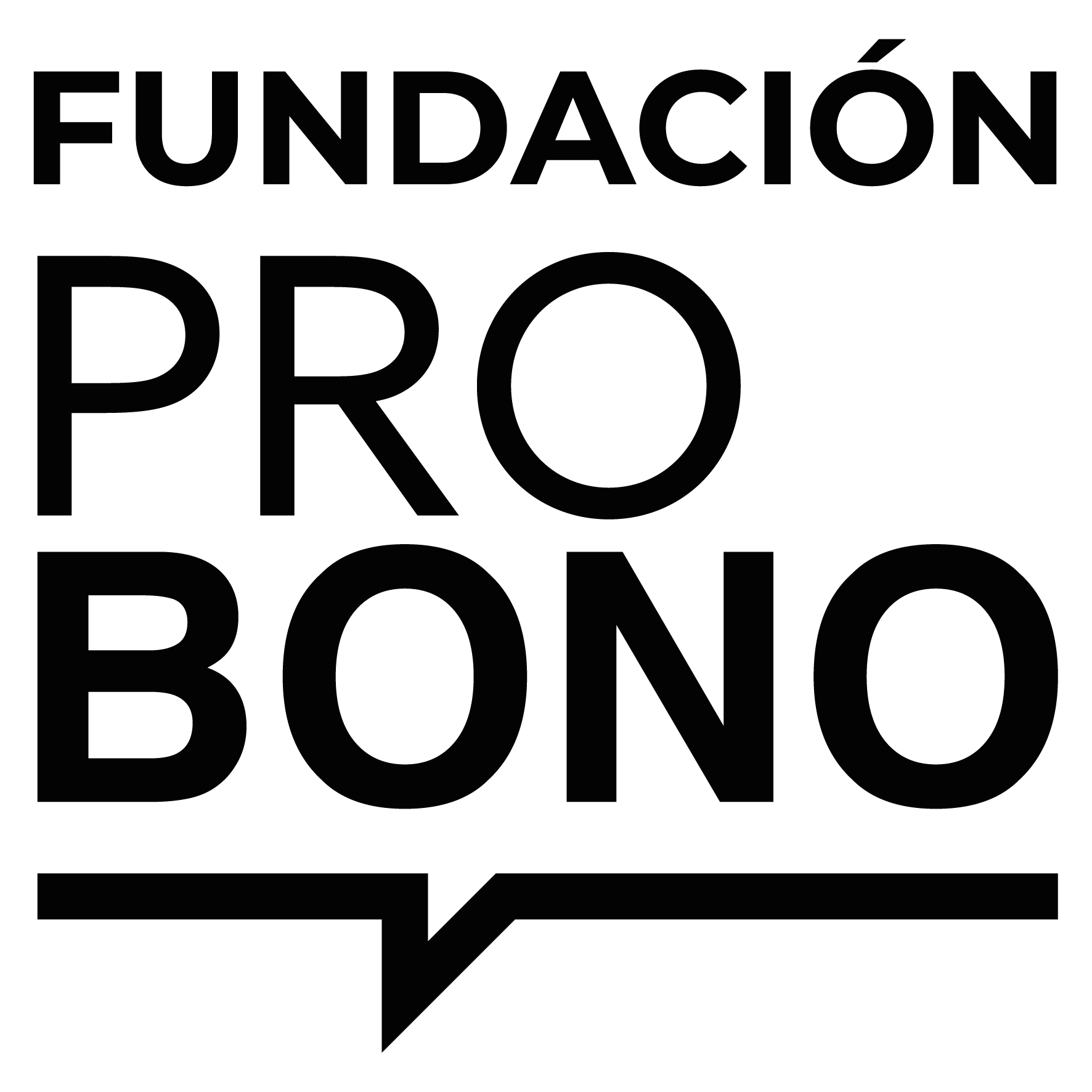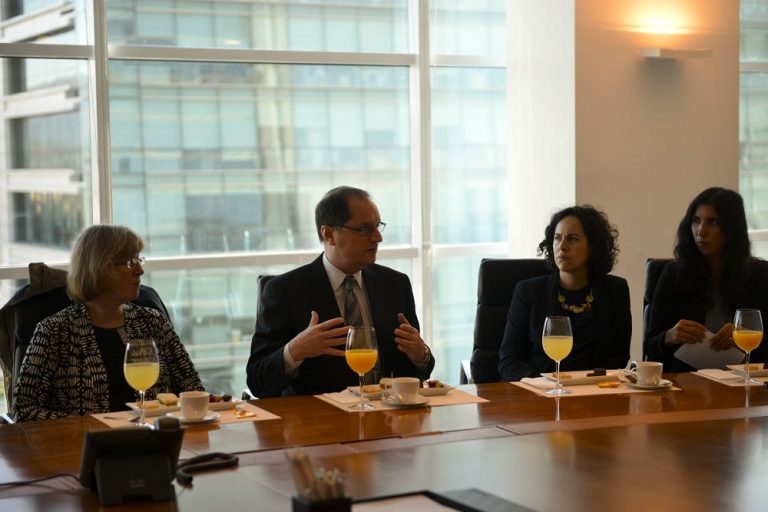Fuente: Latin Lawyer – Tinker Foundation
Kirsten Cowal, de Fundación Tinker, destacó el trabajo de Fundación Pro Bono, como una de las iniciativas más exitosas que Tinker ha apoyado.
Thursday, 3rd November 2011 by Marieke Breijer
Kirsten Cowal is a programme officer for the Tinker Foundation – a key source of funding for pro bono clearinghouses in Latin America. Here Cowal talks to Marieke Breijer about how funding such organisations helps the US-based foundation achieve its goal of developing a fair and equitable society in Latin America
Why does the Tinker Foundation support pro bono clearinghouses?
I should clarify that we fund non-profit organisations that are involved with promoting and facilitating pro bono work. Some operate strictly or exclusively as clearinghouses, others have a broader institutional agenda. They mostly have been clearinghouse-type organisations, but not exclusively.
We got involved about 10 years ago when Francisco Orrego [founder and first president of Chile’s Fundación Pro Bono] from Chile came to visit us and told us about the foundation, which at that time was very new, and that is how we got started. We learnt about the organisation and thought it was a very interesting idea, so we decided to make a grant and it took off from there.
The foundation’s mission is to support the development of a productive and agreeable society in Latin America. Access to justice is a fundamental foundation and prerequisite for good governance, economics and social development, and I think that’s really how it relates.
How do you decide who gets a grant?
Organisations will have to apply. The Tinker Foundation provides grants for specific projects or purposes for relatively limited periods of time. It used to be one or two years, but now that is expanding a little bit to two or three years. For the clearinghouses, the funding is institutional support so they can do their main work: promoting and facilitating pro bono legal assistance.
How large are these grants in general?
The grants have ranged from US$20,000 to US$75,000 per year and the largest grant we have made is US$150,000. That’s the foundation’s grant making approach, our style across the board for all of the issues and programmes we support. The Tinker Foundation has been in existence for 60 years now, and as a function of its small size, it does not have the budget or the resources to provide larger grants or more extended funding.
What are the requirements for clearinghouses to get funding?
We look for some degree of institutionality. We wouldn’t support the establishment of a clearinghouse from the ground up; it has to be legally constituted and has to have at least bare bone staff.
How do you check if everything is in place and if the money is spent on what it was meant for?
We require the organisations to submit their articles of corporation or their bylaws. For organisations outside the US, we require an affidavit to attest that the information they are providing is accurate. We check references, and in terms of after-the-fact verification, we require reports. We do not do very extensive auditing of the organisation for their reports and we are, to some extent, relying on the honesty and integrity of the organisations. We do approve budgetary changes most of the time when we’re requested to do so, but in cases where organisations really don’t do a very good job or use the funds for purposes that were not exactly what they stated they would use it for and did not comply with the requirements, they would simply not receive another grant and lose their good standing.
Do you check in person when you travel to the region?
We do, though it is not something we do across the board as we are based in the US and only have a small staff [the organisation has five full-time employees and one part-time administrative assistant, and a board consisting of nine members] and limited resources, but when we travel to the region, we do also make site visits in some cases.
What does that depend on?
It depends on how prominent or how substantial an investment we have made in the project or event. For example, we gave Chile’s Fundación Pro Bono a grant for its conference (Pro Bono and the Legal Profession: Strengthening Access to Justice)in Chile in April and I attended that event, which was a high-profile one. In other cases, if we receive a number of proposals from the same country, we provide travel to that country to hold a series of meetings.
Is there ever a limit to the number of organisations within a country that you fund?
It really depends on the proposals. We do try to diversify as much as possible; we cover the whole of Latin America, including Brazil, so we have a pretty broad geographic focus. We try to spread out the funding as much as we can, which can lead to a particularly competitive environment in some countries, such as Argentina, as it has a very large number of good NGOs.
Do you reach out to clearinghouses and NGOs yourself?
We do not officially solicit proposals, but we informally invite proposals from the organisations we know and other organisations learn about us through word of mouth.
Where do the funds come from?
The funds come from an endowment, which the whole foundation – from salaries to the grants – runs on. The foundation was established in the late 1950s by Edward Larocque Tinker, who put up the money for the endowment. By law, private foundations must spend at least 5 per cent of the total value of the endowment per year.
Who manages the money?
There are a bunch of investors, and the board has a finance committee that oversees and monitors the investments. The board members themselves do not manage the investments directly.
Is it enough to keep funding the clearinghouses for the foreseeable future?
Supporting the pro bono clearinghouses is one of the priorities. We have a number of priorities that compete for the relatively limited pot of money, but we do not have a budget to support every clearinghouse that deserves it, so I guess the answer is “not exactly”. I think that if [supporting pro bono legal work] were the main priority, we could certainly support most of the clearinghouses, but they really have to rely on the combination of the resources, from corporate donations, law firms, private lawyers and international funders.
What would you see as the ideal way to fund clearinghouses?
I think that they should of course have a mix of funding; they should be largely supported by contributions from the law firms and practising lawyers, and then a mix of other sources so they can maintain their independence – to have the autonomy to define priorities and agendas. It is pretty challenging to get law firms not only to put up pro bono hours, but to make a financial contribution to maintain the clearinghouses as well. There are varying degrees of success in achieving that and that’s really – in terms of the longer term sustainability – pretty crucial.
In the years that you have worked for the foundation have you seen the pro bono culture in Latin America change, and if so, how?
I would say it has taken root, or gained more traction in terms of the commitment from lawyers and law firms, and that there has also been a growing acceptance and praise of the notion of the idea that lawyers have an ethical obligation to do pro bono.
I see different degrees of institutionalisation in different countries and that is a very positive trend. I hope that law firms, along with businesses, maintain that commitment.
In your opinion, what has been a real success story in the years that you have worked for the Tinker Foundation?
Well, I think that the Fundación Pro Bono in Chile has been a success. We have supported the organisation almost since inception and we were probably the earliest foundation to support this organisation, and they have gotten support from a variety of other sources since, including larger international foundations. Certainly we count it as one of our big success stories, and we hope that it is replicable and that the same process can take place in other countries.


